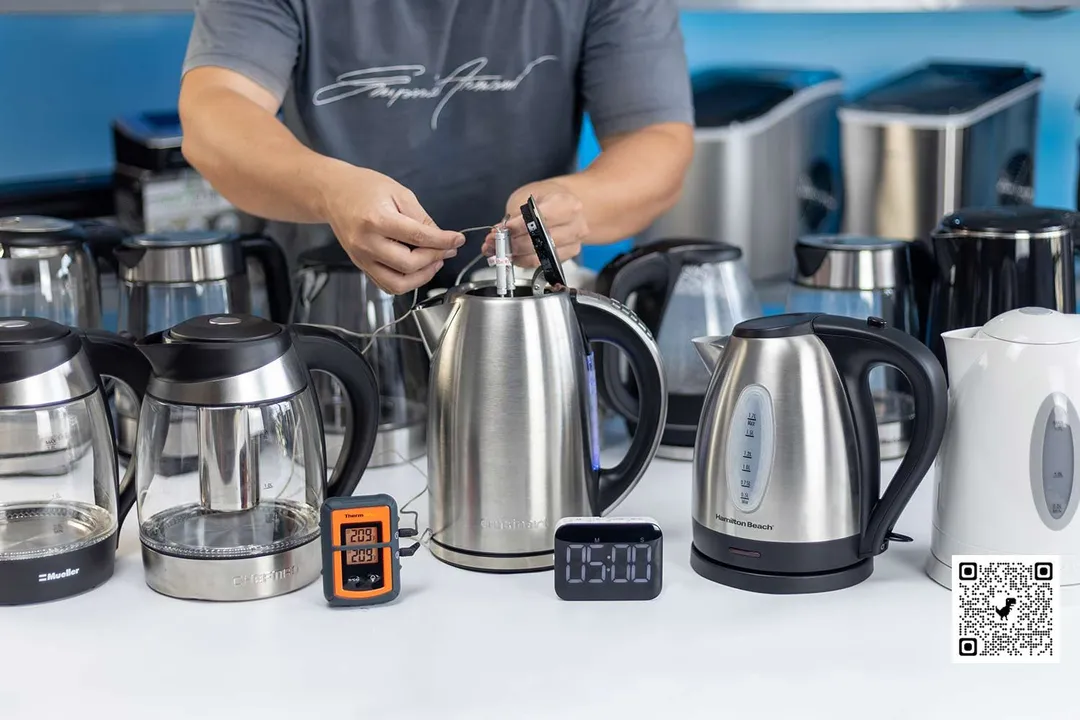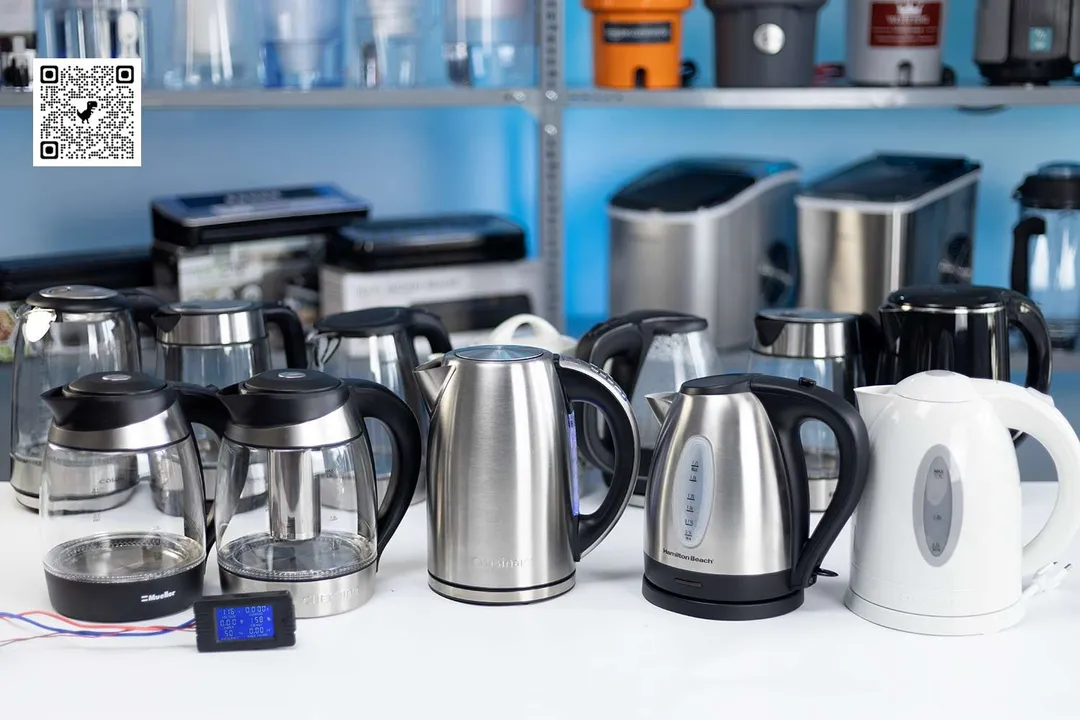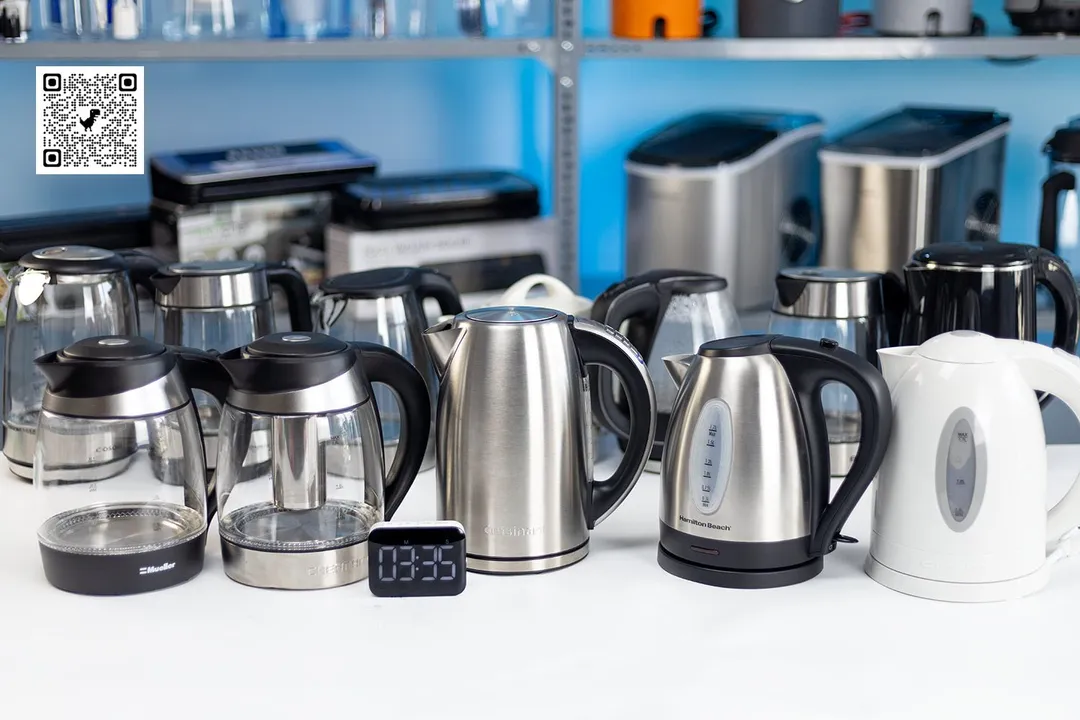Our recommendations are made independently through Research & Testing. We may receive commissions from purchases made via our links.
Noise Level Test for Electric Kettles
Some sources claim the faster a kettle boils water, the less noisy it is. However, our extensive testing of electric kettles showed no correlation between the two. Find out how noise is actually produced in an electric kettle, when to be concerned, and how we rate kettles.
This test is part of How We Test Electric Kettles v1.0
Most electric kettles are quieter than the old-fashioned ones whistling away on the stove-top. Surprisingly, some electric kettles can still be relatively loud, up to 95 decibels—similar to a lawn mower!—and not something you’d want in your kitchen.
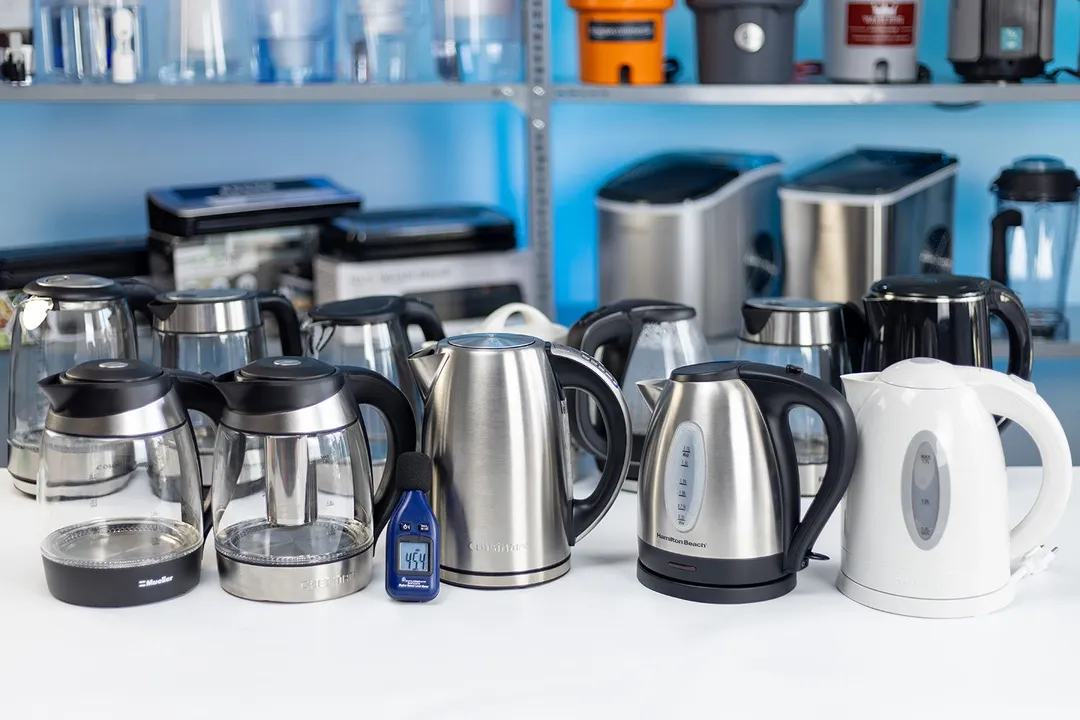
There are ways to help dampen the noise of a working electric kettle such as placing the kettle on a rubber mat or covering it with a tea cozy. But, it’s better to get a kettle with an overall good design.
While researching electric kettles, we found sources that claimed the faster the kettle boils water, the less noisy it is. However, our test results showed no clear correlation between boiling time and noise level.
Low noise levels are important for perhaps an office or a small apartment, so we assign this a total of 15% of our total Performance Score. Boiling time (45%) is the most important factor overall followed by energy consumption (30%), noise level, and then heat retention or keep warm (10%).
This test is performed simultaneously with our Boiling Time test. We use 1.5 liters of room-temperature tap water with a starting temperature of 80°F (26.7°C).
Where Does the Noise When Boiling Water Come From?
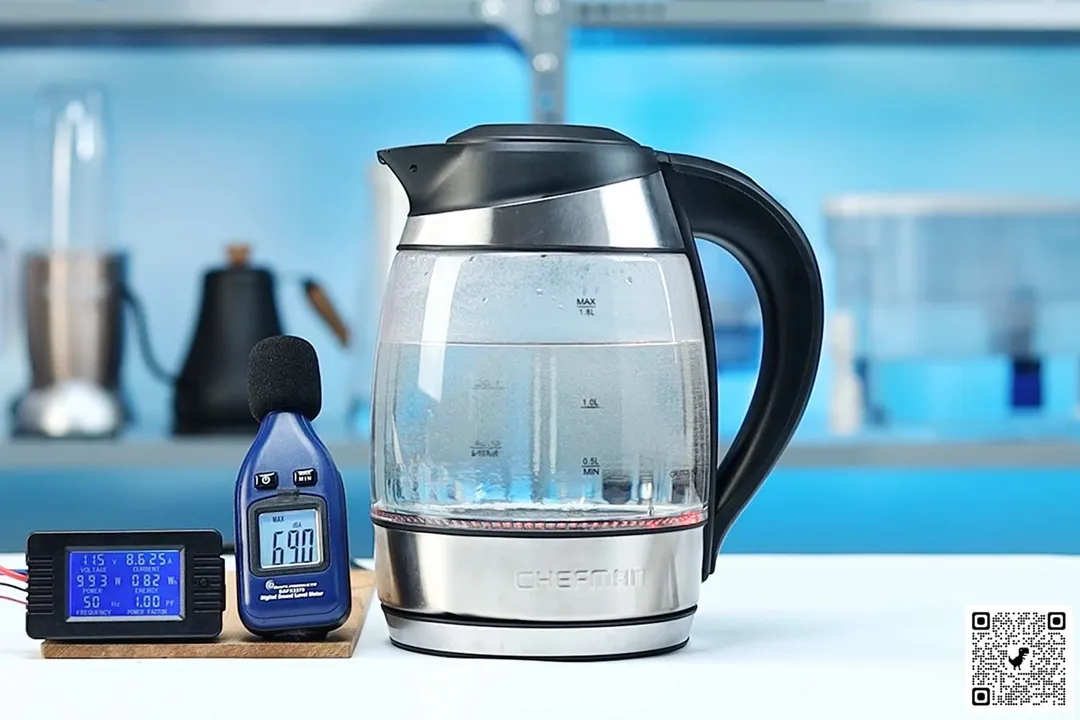
The noise created when boiling water in a kettle is due to cavitation or pockets of empty space in the water.
Because the heating element is in the bottom of the kettle, the water below heats up first. Hot water has a lower density than cold water, so it will rise through the colder water above.
As the hot water travels, it loses heat and regains density creating the said pockets. The pockets then get filled with water and the cycle makes the bubbling sound you hear when the kettle’s working.
During our testing process, we noticed that the noise level usually peaked during the rolling simmer phase, not the rolling boil phase. This coincided with the fact that as more of the water becomes hot, there’s less cavitation, and thus, less noise.
Noise Meter
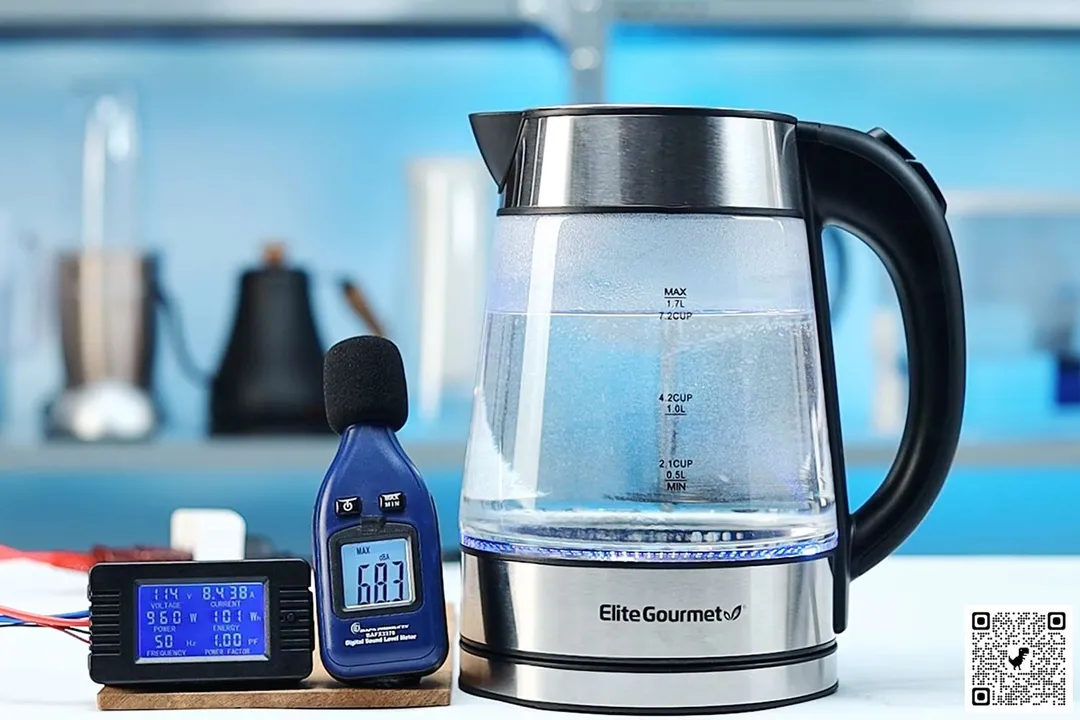
To conduct this Noise Level test, we simply need to set up a noise meter / sound level meter and point its microphone toward and a couple inches away from the kettle. Our noise meter has a feature that allows it to capture the highest sound level recorded, which was exactly what we need.
We also found that the loudest noise from the kettle is actually the sound of the bimetallic disk in the power base flipping to turn the kettle off. Thus, we actually needed to record the highest sound pressure level right before the kettle turned off.
While the noise meter took care of most of the work, we still needed to keep watch and make sure that no external sources of noise disturbed the readings. There were instances where people talked loudly in the hallway of our building or some of our colleagues didn’t read the notice and tried to open the door!
Steps
1. Fill the kettle with 1.5 liters of room-temperature tap water and plug in (we use a customized outlet as per our Energy Consumption test).
2. Turn on the kettle and make sure that the indicator light is on.
3. Turn on the noise meter and press Max to capture the highest sound pressure level during boiling the process.
4. Monitor the sound pressure level using the noise meter.
5. Record the peak sound pressure level right before the kettle turns off for data collection.
Scoring
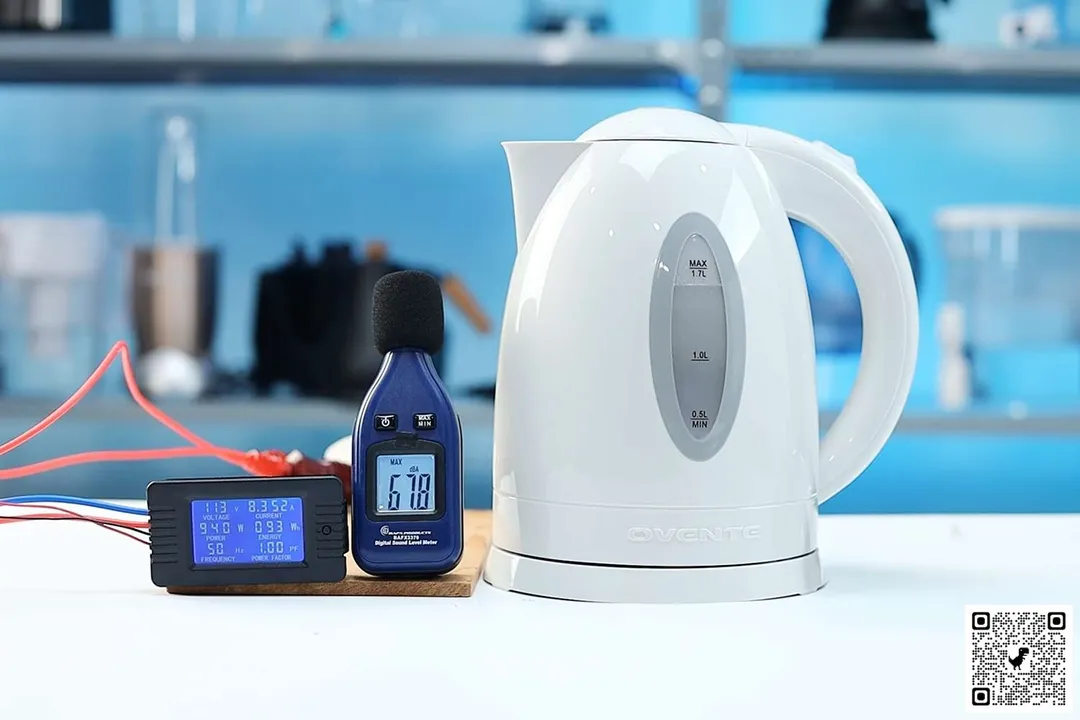
According to the CDC, damage to hearing may occur after about 2 hours of exposure to 80 dB. A typical boiling time for a kettle is around 6 to 9 minutes with a noise level lower than 80 dB, so it’s not likely to cause any harm. As such, we chose 80 dB to be our benchmark for an 8/10 score.
Every decibel louder translates to a 0.2‒point deduction and vice versa with every decibel lower translating to a 0.2‒point increase. Because hearing loss can occur in less than 5 minutes at 105 dB, any kettle that reaches that point or beyond would hypothetically receive 0 points.
10 | 9 | 8 | 7 | 6 | 5 | 0 |
|---|---|---|---|---|---|---|
60 dB | 70 dB | 80 dB | 90 dB | 1000 dB | 105 dB | > 105 dB |
Test Developers
Alan Nguyen is a writer and product reviewer at HealthyKitchen101. His major in English language teaching taught him to present concise information. In addition to his cooking hobby, he values the practical aspects of household appliances.
Lap is Head of the Research, Testing, and Review Team (RTR Team) at HealthyKitchen101.com, where he directs and supervises the testing of kitchen gadgets and appliances.
Nguyen Ntk is a graphic designer, photographer, and videographer whose philosophy centers around respecting and celebrating the beauty of reality. Through his lenses, Nguyen strives to capture the true essence of objects and events, showcasing and highlighting authentic features without distortion or exaggeration.



